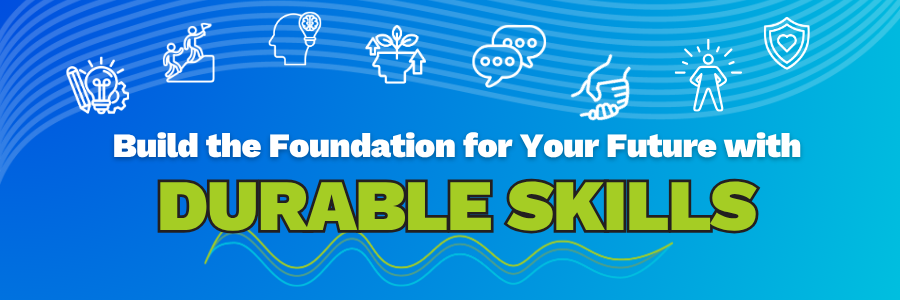Durable Skills: Communication 🗣️✨
Last updated June 26, 2025
Good communication can help you express yourself clearly, build relationships, and resolve conflicts–both in your personal life and in your career! Watch the video and read more below about how communication—a key durable skill—helps you build trust in a professional setting!
What is communication?
Communication isn’t just about the words you say, but how and when you say them, and how well you listen to others. It’s not about listening to respond, but listening to understand. Effective communication is essential because it helps you build trust, set boundaries, resolve problems, and advocate for yourself and others.
Why communication matters
We all communicate every single day. Whether you're answering a friend’s question, writing an email to a teacher, presenting in class, or explaining a mistake to your manager, how you communicate affects how people see you and whether they can rely on you. Strong communication leads to collaboration, teamwork, and respect. That’s why employers consistently list communication as one of the top skills they look for when hiring!
Although AI can write emails and even summarize the communications others have sent to us, it doesn’t have a human touch. AI can’t determine whether your coworker is feeling stressed based on her body language or notice a change in tone of your manager’s voice. Only you can! AI can’t replace the complex and very human dynamics in work, school, and life. That’s why it’s up to us to learn how to be effective communicators.
Actionable ways to grow your communication skills
Here are a few specific ways you can strengthen your communication skills:
Practice active listening
Listening is an essential part of communication! Test out your active listening skills with a friend or classmate. During your next conversation, make space for them to share their ideas and chime in with small verbal cues like “That makes sense” or “Tell me more.” You can also incorporate your body language into active listening by making eye contact and avoiding checking your phone while they speak. Not only does active listening help others feel heard and valued, it also strengthens your memory, empathy, and ability to respond thoughtfully.
Ask clarifying questions
Closed mouths don’t get fed! If you don’t understand something in school or at work, be sure to ask questions to get the clarity you’re looking for. Try asking follow-up questions to a teacher if you don’t understand a class concept or a member of your school club if you aren’t sure what your responsibilities are that month. You can ask questions like “Can you walk me through that again?” or “Could you give an example?” Asking questions shows confidence and prevents misunderstandings. It signals to others that you care about doing things well and aren’t afraid to learn!
Why communication is a lifelong skill
Communication is a lifelong skill that affects all areas of your life. Your ability to express and understand feelings and desires through language is priceless! In a world full of fast messages and automated replies, authentic communication stands out more than ever.
Want to learn more about durable skills? Dive into the essential and timeless skills that help young people thrive in work, school, and life to achieve long-term success!
